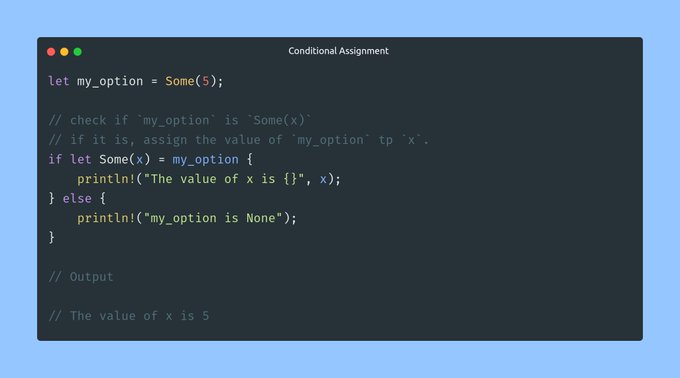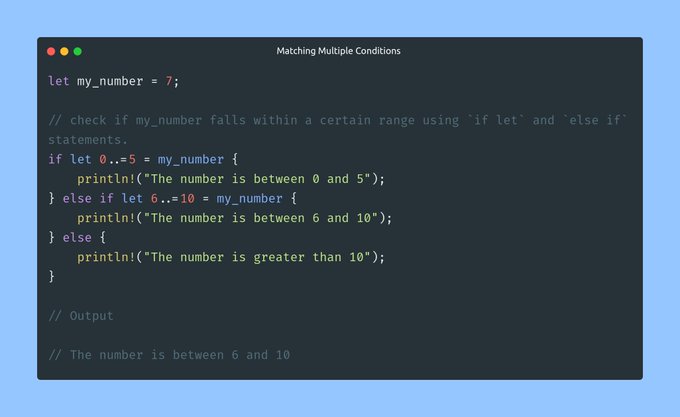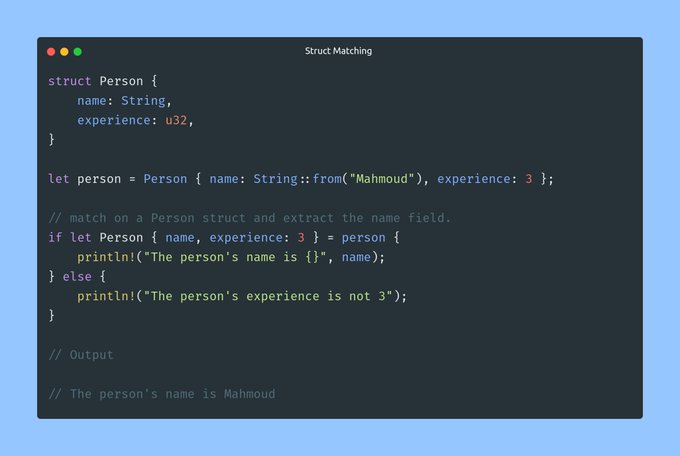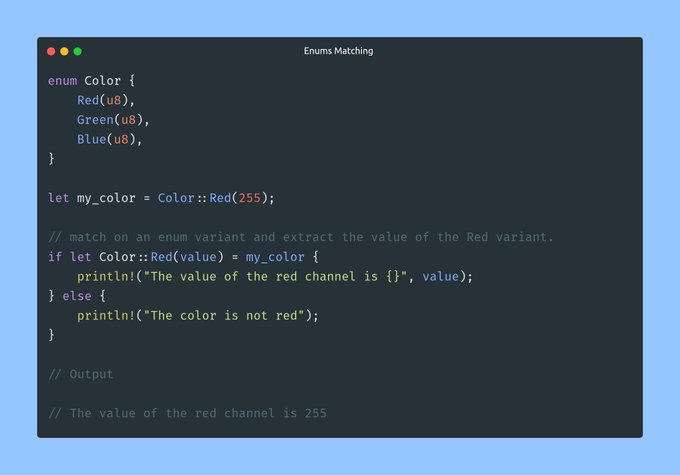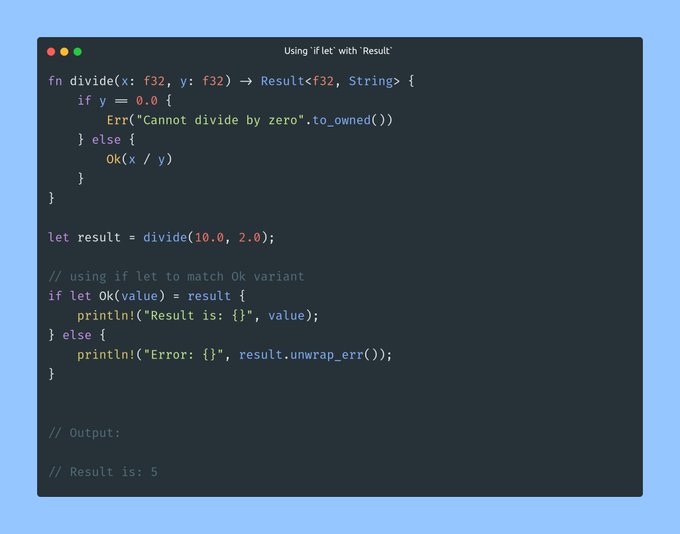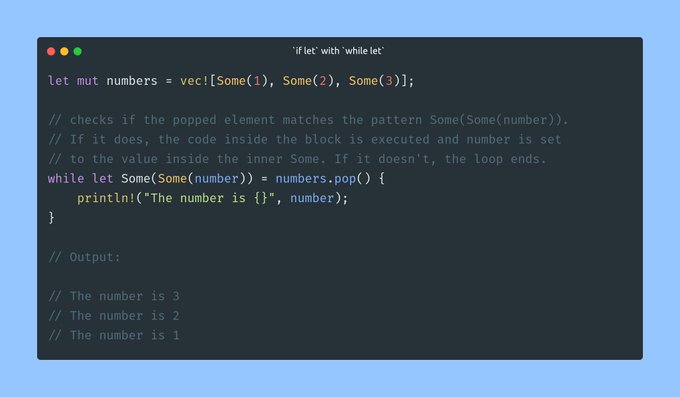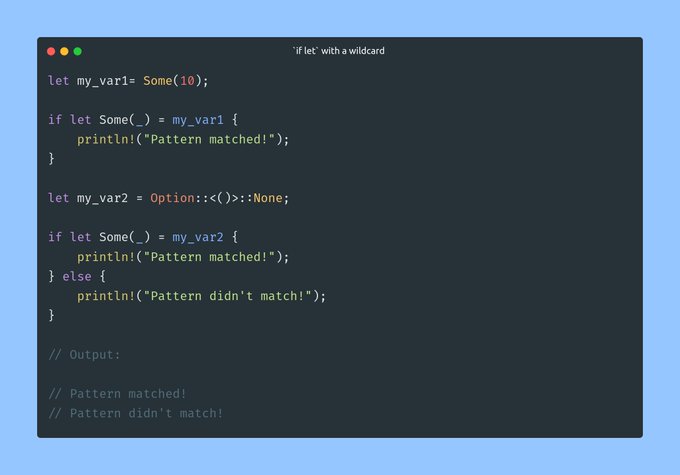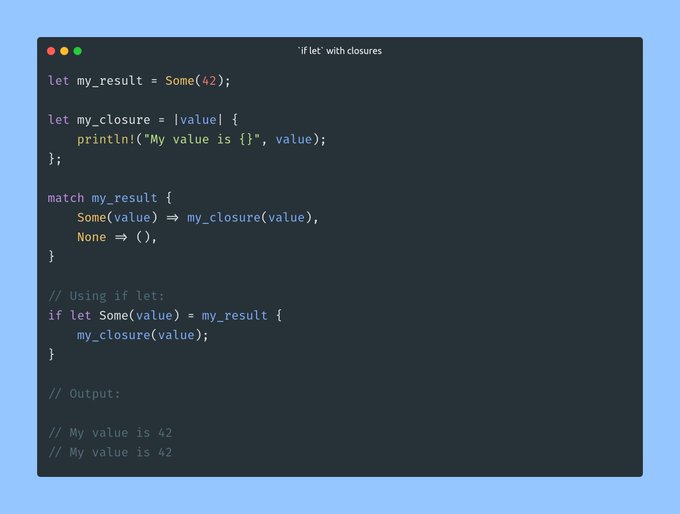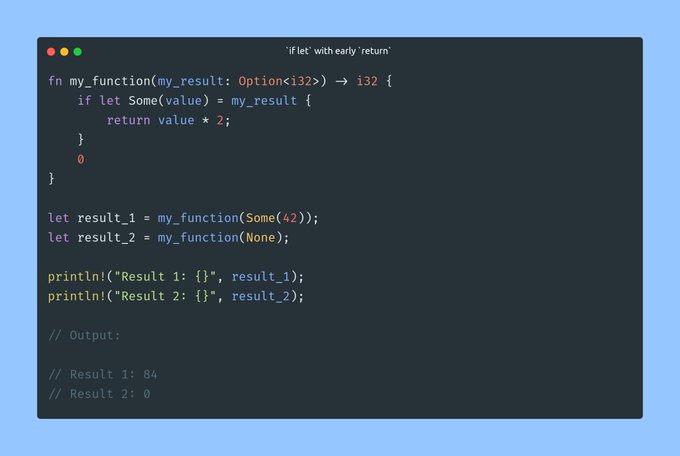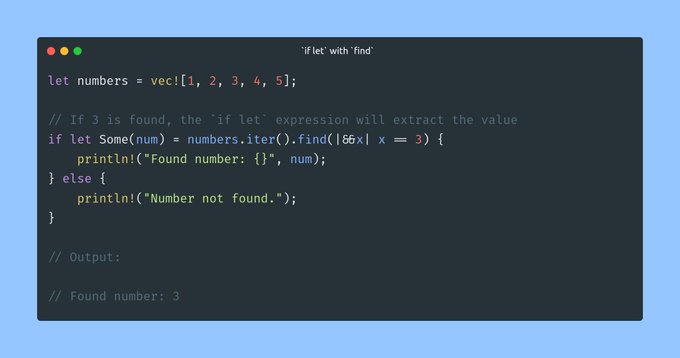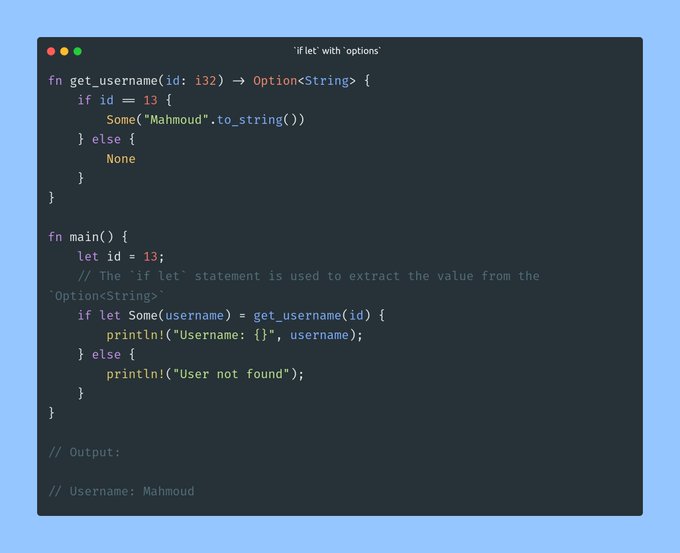🧵 If Let
-
Conditional Assignment
if letis a shorthand syntax for matching and binding on a single pattern.- It can be used to conditionally assign a value to a variable.
- It is useful when you only care about one pattern and want to avoid writing a full match expression.
let my_option = Some(5); // check if `my_option` is `Some(x)` // if it is, assign the value of `my_option` tp `x`. if let Some(x) = my_option { println!("The value of x is {}", x); } else { println!("my_option is None"); } // Output // The value of x is 5 -
Matching Multiple Conditions
if letcan also be used in combination withelse ifstatements to match multiple conditions.- This can help to simplify code and avoid nested match expressions.
let my_number = 7; // check if my_number falls within a certain range using `if let` and `else if` statements. if let 0..=5 = my_number { println!("The number is between 0 and 5"); } else if let 6..=10 = my_number { println!("The number is between 6 and 10"); } else { println!("The number is greater than 10"); } // Output // The number is between 6 and 10 -
Struct Matching
if letcan also be used to match on structs and extract their fields.- This can be useful when you only care about one or two fields in a struct
struct Person { name: String, experience: u32, } let person = Person { name: String::from("Mahmoud"), experience: 3 }; // match on a Person struct and extract the name field. if let Person { name, experience: 3 } = person { println!("The person's name is {}", name); } else { println!("The person's experience is not 3"); } // Output // The person's name is Mahmoud -
Enums Matching
- if let can also be used to match on enums and extract their variants.
- This can be useful when you only care about one or two variants of an enum.
enum Color { Red(u8), Green(u8), Blue(u8), } let my_color = Color::Red(255); // match on an enum variant and extract the value of the Red variant. if let Color::Red(value) = my_color { println!("The value of the red channel is {}", value); } else { println!("The color is not red"); } // Output // The value of the red channel is 255 -
Using
if letwithResult- The Result type in Rust can be either an Ok variant or an Err variant.
- We can use the if let expression to match the Ok variant and extract the value from it.
- The if let expression can also handle the Err variant with an else block.
fn divide(x: f32, y: f32) -> Result<f32, String> { if y == 0.0 { Err("Cannot divide by zero".to_owned()) } else { Ok(x / y) } } let result = divide(10.0, 2.0); // using if let to match Ok variant if let Ok(value) = result { println!("Result is: {}", value); } else { println!("Error: {}", result.unwrap_err()); } // Output: // Result is: 5 -
if letwithwhile letif letcan be used in combination withwhile letto handle pattern matching in a loop.- This is useful when you want to keep looping while a certain pattern matches.
let mut numbers = vec![Some(1), Some(2), Some(3)]; // checks if the popped element matches the pattern Some(Some(number)). // If it does, the code inside the block is executed and number is set // to the value inside the inner Some. If it doesn't, the loop ends. while let Some(Some(number)) = numbers.pop() { println!("The number is {}", number); } // Output: // The number is 3 // The number is 2 // The number is 1 -
if letwith a wildcard- If let can also be used with a wildcard (_) to match any value in a particular variable.
- This is particularly useful when we are only interested in knowing if the pattern matches or not.
- Using a wildcard (_) is the same as using a variable without assigning it to a value.
- The underscore (_) is used to discard values and it is a special variable in Rust.
let my_var1= Some(10); if let Some(_) = my_var1 { println!("Pattern matched!"); } let my_var2 = Option::<()>::None; if let Some(_) = my_var2 { println!("Pattern matched!"); } else { println!("Pattern didn't match!"); } // Output: // Pattern matched! // Pattern didn't match! -
if letwith closures- You can use if let statements to simplify closures by removing unnecessary match statements.
- If a closure only has a single pattern match, you can use if let to simplify the code and make it more readable.
- The closure will only be executed if the pattern match is successful.
let my_result = Some(42); let my_closure = |value| { println!("My value is {}", value); }; match my_result { Some(value) => my_closure(value), None => (), } // Using if let: if let Some(value) = my_result { my_closure(value); } // Output: // My value is 42 // My value is 42 -
if letwith earlyreturn- You can use if let with an early return statement to simplify code and reduce nesting.
- If the pattern match is successful, the return statement will be executed immediately, without any additional code in the block being executed.
- This can be useful for cases where you want to exit a function early if a certain condition is met.
fn my_function(my_result: Option<i32>) -> i32 { if let Some(value) = my_result { return value * 2; } 0 } let result_1 = my_function(Some(42)); let result_2 = my_function(None); println!("Result 1: {}", result_1); println!("Result 2: {}", result_2); // Output: // Result 1: 84 // Result 2: 0 -
if letwithfind- Rust’s standard library provides a
findmethod for searching an iterator for an element that satisfies a predicate. - We can use
if letwithfindto extract the found valueif itexists.
let numbers = vec![1, 2, 3, 4, 5]; // If 3 is found, the `if let` expression will extract the value if let Some(num) = numbers.iter().find(|&&x| x == 3) { println!("Found number: {}", num); } else { println!("Number not found."); } // Output: // Found number: 3 - Rust’s standard library provides a
-
if letwithoptions- Rust’s Option type is used to represent the presence or absence of a value.
- We can use if let to extract the value from the Option if it contains a value, otherwise do nothing.
- This can be useful when we only care about the case where the Option has a value and want to handle it specially.
fn get_username(id: i32) -> Option<String> { if id == 13 { Some("Mahmoud".to_string()) } else { None } } fn main() { let id = 13; // The `if let` statement is used to extract the value from the `Option<String>` if let Some(username) = get_username(id) { println!("Username: {}", username); } else { println!("User not found"); } } // Output: // Username: Mahmoud
You can refer to this Twitter thread for reference
